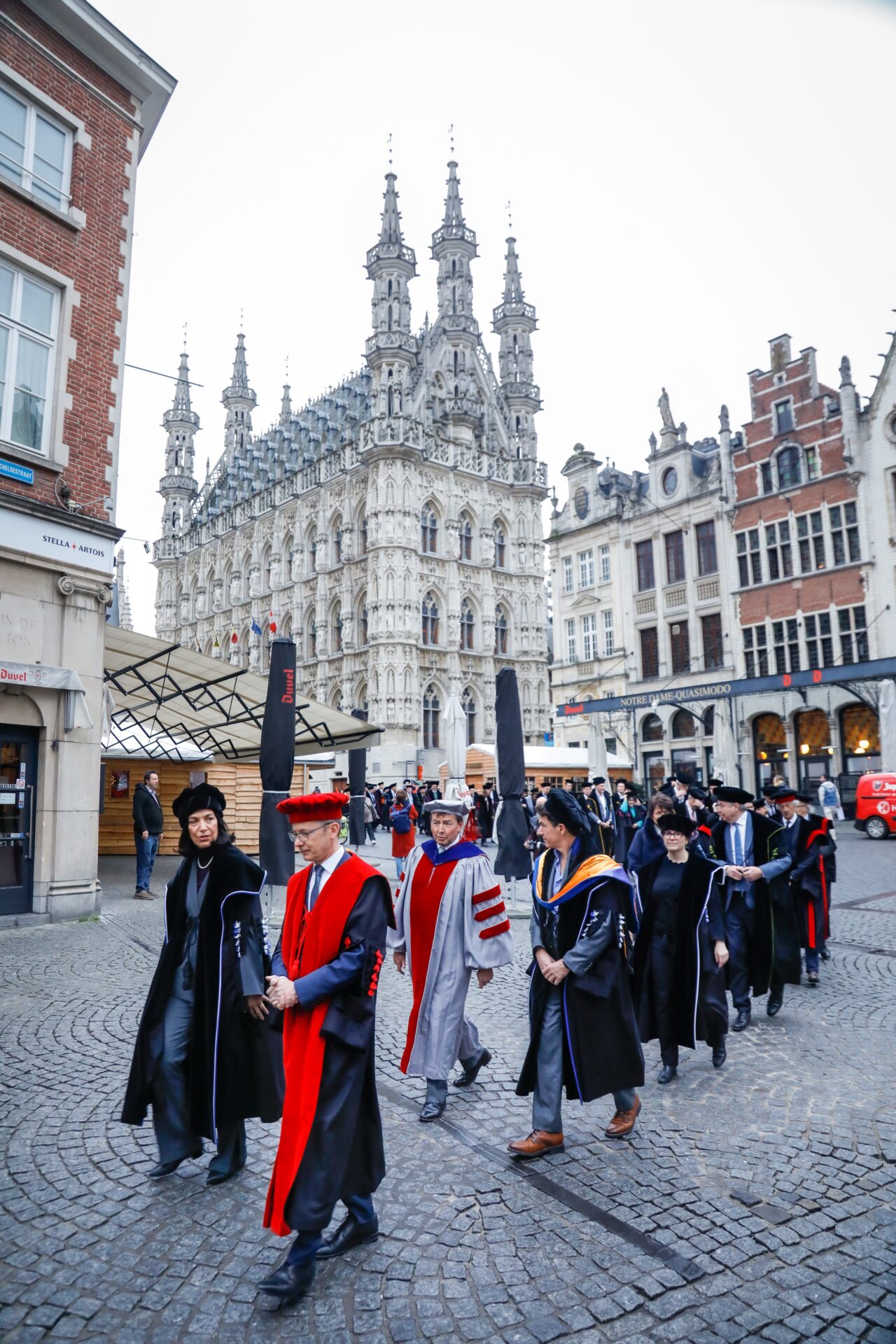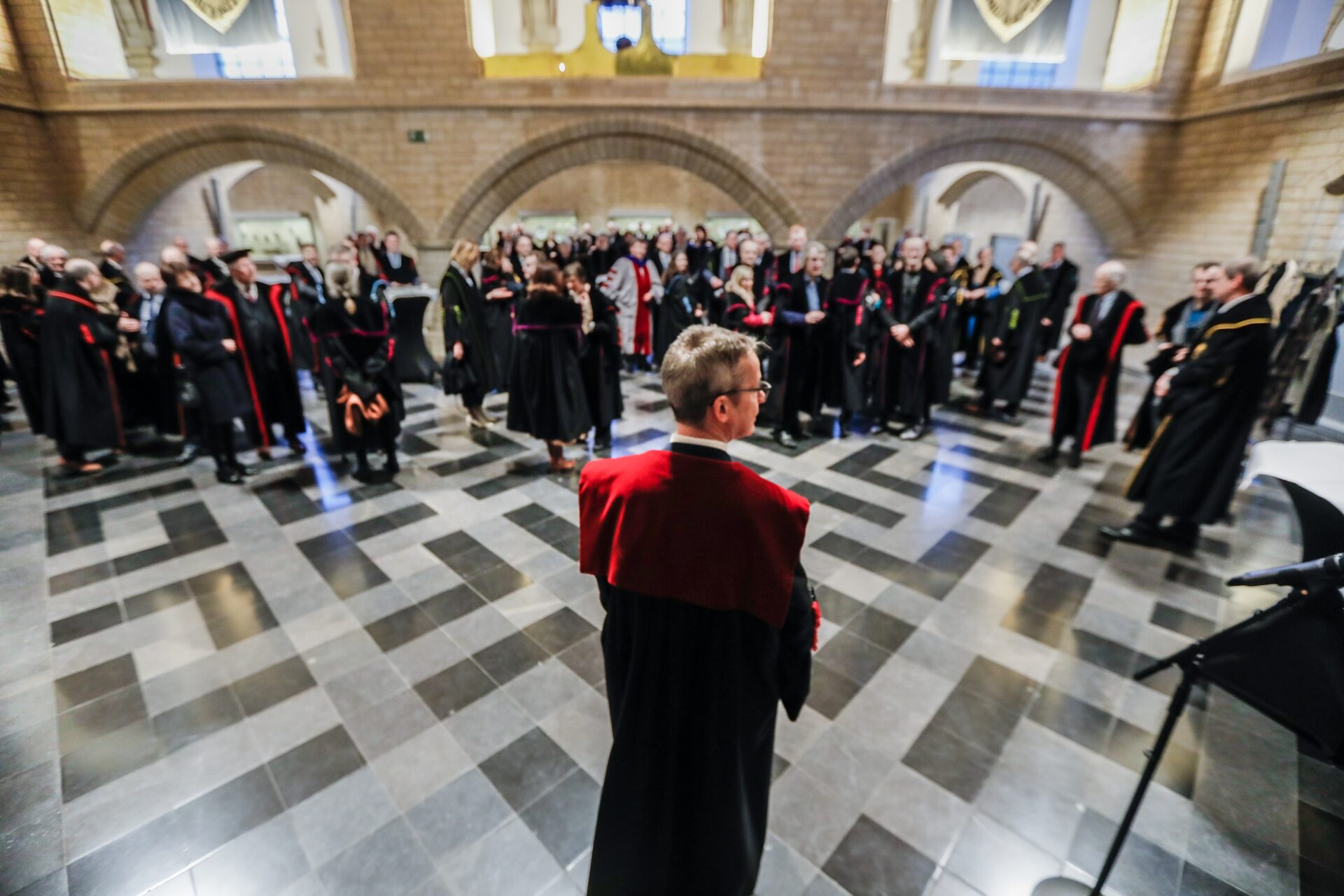In Leuven, everyone is a ‘professor’, but that does not mean that everyone is equal
-
 Professoren in Leuven. Foto: Rob Stevens
Professoren in Leuven. Foto: Rob Stevens
In Leuven, all tenured researchers are professors. So is this the egalitarian paradise we all dream of? Trade union chairwoman Maïka De Keyzer: ‘Not quite. Leuven is the most hierarchical university in Flanders.’
There is a musty smell. Beneath the white-plastered vaults are rows of grey, steel cabinets. Here, in the Kolommenzaal in the basement of Leuven University Hall, gowns await their professors. ‘We store one thousand gowns here,’ says caretaker Wouter Stein. ‘We’re full now. New professors must keep their gowns at home.’
The tassel colours on the sleeves indicate the faculty: red for law and theology, yellow for arts, and khaki green for economics. Among the thousand gowns, many belong to emeritus professors, some of whom are deceased. Current professors can borrow these gowns for events such as thesis defence, the academic year’s opening ceremony, or the Candlemas ‘Procession of Gowns’ through the city. However, only a small fraction participates in these events. Leuven boasts over 1,800 professors.
Maïka De Keyzer is one of them. She now knows what to look out for when selecting a gown. De Keyzer is a historian and associate professor. In Flanders, this grants you the right to use the title of professor and wear the academic gown of honour. ‘I always look for the gown of a short man,’ says De Keyzer. ‘The majority of emeriti are men and you don’t want your gown dragging on the floor, so I have to search quite a bit.’ The historian has in the meantime found her compact emeritus: her own predecessor, historian Herman van der Wee. Unlike his publication list, De Keyzer explains, ‘he was not gigantic’.
‘I hate gown. I think they’re terrible.’
De Keyzer has no plans to purchase her own academic gown. ‘I hate them. I find them dreadful. If it were up to me, we’d abolish the concept entirely.’ Historian Jo Tollebeek, on the other hand, feels differently. When he became a professor, he had a gown made. ‘I don’t remember the first time I wore it, but it must have been a joyful occasion—not for the gown itself, but for what it symbolised: a permanent position.’
Leuven researchers are living the dream of activist academics on campus Heijendaal. Anyone with a permanent contract as a researcher may call themselves ‘professor’ and wear a gown. And they also have the ius promovendi from the start. Can we in Nijmegen learn something from that other Catholic university just across the border?
Both De Keyzer and Tollebeek have insights to offer. De Keyzer, a rising star in Leuven’s history department and union leader, critiques the system from within. Tollebeek, on the cusp of retirement, has led Leuven’s Faculty of Arts as its dean for six years. Both have worked in the Netherlands – in Utrecht and Groningen, respectively, bringing a comparative perspective to their analyses.
Independent
What is a professor in Belgium anyway? ‘You must distinguish between Flanders and French-speaking Belgium. Education, including higher education, is federalised, so rules differ. In Flanders,’ Tollebeek continues, ‘there is a category that is above the title of professor, the ZAP (zelfstandig academisch personeel): independent academic staff. Upon joining the ZAP, you immediately gain all the associated rights, regardless of rank.
The key word is independent, Tollebeek emphasises. ‘A ZAP member has no boss. You set your research agenda, supervise PhD candidates, and manage research funds, whether you’re a junior lecturer or a senior professor.’
‘It’s definitely not all kumbaya and equality here’
While academic ranks such as lecturer, senior lecturer, professor, and full professor still exist, the differences in rights are minimal. ‘Previously, only the top three ranks could wear gown, but now even lecturers can,’ Tollebeek explains. Certain leadership roles remain exclusive to the highest ranks, but otherwise, professors in Flanders enjoy remarkable autonomy.
This academic equality is not something the Dutch associate with Flanders. Flemings—and Belgians as a whole—are often seen in the Netherlands as a more hierarchical people. Meanwhile, the Dutch love to pride themselves on their egalitarian directness. And to be fair, they’re not entirely wrong. There’s evidence to suggest that Belgians indeed have a greater respect for power dynamics. For example, on Geert Hofstede’s well-known cultural dimensions map, Belgians score a remarkable 27 points higher than the Dutch in terms of acceptance of authority. (Granted, the Hofstede model is far from uncontested.) This makes the Flemish egalitarian university system seem at odds with the broader national culture.
The current Flemish professorship system is only a few decades old. It emerged during a very particular moment in Belgian history. In 1968, the language struggle reached its peak. After massive student protests, the university in Leuven was split into the French-speaking Université catholique de Louvain and the Dutch-speaking Katholieke Universiteit Leuven. French-speaking scholars and students moved to the newly created campus town of Louvain-la-Neuve, while the Flemings remained in their historic homeland. Shortly after, a similar division happened at the university in Brussels.
Tollebeek: ‘This expansion meant a sudden need for many more professors. Leuven appointed a new generation of young academics, often educated abroad, especially in the United States. They viewed Leuven as a traditionalist institution weighed down by excessive rituals and questioned the legitimacy of its academic authorities.” Riding the wave of broader democratization movements and strong Belgian trade unions, these academics transformed the university: everyone became a professor.
Fundamental rights
Surely, in this anarcho-syndicated sanctuary state, there is no work left to do for Keyzer’s union? The party chair bursts out laughing. ‘Oh, absolutely. KU Leuven is the most hierarchical university in Flanders. It’s far from kumbaya and equality here.’ De Keyzer is an Antwerp native and you can hear it. She has been spreading dockworker socialism among Leuven’s intellectual workers. ‘It remains necessary,’ she says passionately, ’to fight for fundamental rights in academia.’ According to her, the Flemish academic system is far from flat despite appearances.
‘You have fragmented powers and a lot of responsibility. I had little time to do research.’
‘For the first five years in the ZAP, you are what I call a professor on probation.’ Permanent contracts are only granted after proving your worth during this tenure-track phase. “It’s sink or swim—you must take on extensive teaching duties, supervise PhD students, secure funding, and engage in numerous administrative tasks.’
Opportunities for young Flemish academics often morph into towering expectations. ‘There’s fragmented authority and heavy responsibility from the outset, which creates immense pressure. Comparing myself to peers in the Netherlands, I found I had far less time for research due to the sheer number of roles I had to juggle.’
Meanwhile, De Keyzer observes many senior professors who either rest on their laurels or take administrative roles solely to build their CVs, with little genuine interest in leadership.
Skewed pyramid
Is this critique just an example of the Tocqueville paradox—where inequality becomes more intolerable in a seemingly equal society? Flemish professors enjoy opportunities their Dutch counterparts can only dream of, yet the grumbling persists. According to De Keyzer, the starkest inequality lies not within the ZAP itself but in the “huge gap” between the small group of permanent staff and the masses of PhD candidates beneath them.
‘Without a middle tier, everyone may technically be a professor’
‘We lack a proper academic middle tier like in the Netherlands,’ De Keyzer explains. ‘Flemish universities have a broad base of PhD students and a narrow bottleneck at the top. PhD candidates are classified as students with tax benefits, making them cheaper than hiring postdocs. Additionally, there are few lecturer or senior lecturer positions because these roles are expected to eventually lead to costly professorships. Without a middle tier, everyone may technically be a professor, but that ‘everyone’ is a very small group.’
If Nijmegen citizens can learn something from Leuven, it is perhaps that hierarchy is a stubborn reality in any large institution. This is evident even in the Kolommenhal, where caretaker Stein prepares for a ceremonial meeting in the auditorium. A prominent professor is retiring, and distinguished guests are expected. ‘The rector and emeritus rector will be here soon,’ Stein says excitedly, ‘and, of course, the important people shouldn’t have to wait for their gowns.’






